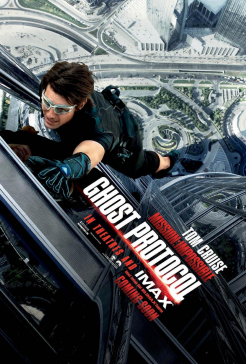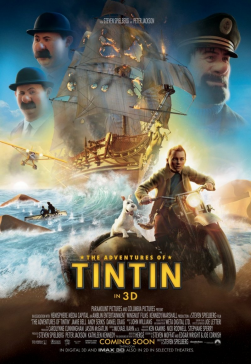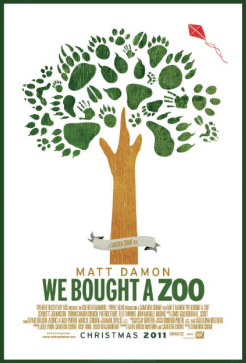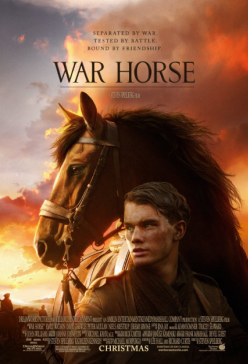 The feeling of the impossible is very evident while viewing Mission Impossible: Ghost Protocol. The idea of a director, who has virtually no experience with live action films, putting an aging actor back into an already dragged out series, sounds improbable. However, Brad Bird and Tom Cruise come together to make possibly the best Mission Impossible film yet with thrilling stunts, fantastic set pieces and great humour. While the story is by no means complex, it sets the bar for constant entertainment and character dilemmas. Tom Cruise is enthralling with constant energy and is ever-willing to perform insane stunts while Brad Bird captures every action-packed moment with clarity and attention to direction. In several of the large action sequences, Bird always keeps the camera on what is important. Even during an intense chase through a massive sandstorm in the Dubai, Bird’s camera never moves too fast to lose the action but keeps tension and excitement at an all-time high.
The feeling of the impossible is very evident while viewing Mission Impossible: Ghost Protocol. The idea of a director, who has virtually no experience with live action films, putting an aging actor back into an already dragged out series, sounds improbable. However, Brad Bird and Tom Cruise come together to make possibly the best Mission Impossible film yet with thrilling stunts, fantastic set pieces and great humour. While the story is by no means complex, it sets the bar for constant entertainment and character dilemmas. Tom Cruise is enthralling with constant energy and is ever-willing to perform insane stunts while Brad Bird captures every action-packed moment with clarity and attention to direction. In several of the large action sequences, Bird always keeps the camera on what is important. Even during an intense chase through a massive sandstorm in the Dubai, Bird’s camera never moves too fast to lose the action but keeps tension and excitement at an all-time high.
But while this is still an action movie, Bird does not forget his greatest trait – he builds the characters of Cruise’s team. Simon Pegg brings his trademark humour to every scene he is in, from stealth espionage to literally levitating Jeremy Renner through a massive computer. Renner brings a character that has more to him than one face – he brings a level of depth unseen with most MI secondary characters which is defiantly refreshing. While this movie is by no means unique, it is still an entertaining and intense spectacle that keeps the viewer tuned in and wanting to see what happens next.
The Adventures of Tintin
 When Captain Haddock imparts some choice advice to ace reporter/criminal investigator/firearm acrobat Tintin, it seems at odds with the movie it is taking place in, for if these are The Adventures of Tintin, any Indiana Jones-like (director Spielberg has described this series as a kids version of that fabled franchise) realizations should come out of the adventure, not stop the fun at the eleventh hour for life lesson time. But if the script by Steven Moffat, Edgar Wright and Joe Cornish has its faults, Spielberg’s visuals of the world Tintin inhabits—which are one step removed from both the “real world” and the cartoon world of Hergé’s comics, and thus walk a fine balance between traditional camera movement and composition and gravity defiant, physically freed flights—ably make up for them. The animation style—thankfully free of the dead eyes and weird skin tones (camels notwithstanding) of previous motion capture cartoons—is impressively detailed, and the action scenes—taking place in every altitude and temperature except for below zero and below ground—are vertiginously exciting. There is one in particular that upstages everything that took place in Spielberg’s last movie on its own, showing he still knows better than almost anyone how little is needed to create a fantastic, energy-filled, action scene (in this case, a gust of wind or two).
When Captain Haddock imparts some choice advice to ace reporter/criminal investigator/firearm acrobat Tintin, it seems at odds with the movie it is taking place in, for if these are The Adventures of Tintin, any Indiana Jones-like (director Spielberg has described this series as a kids version of that fabled franchise) realizations should come out of the adventure, not stop the fun at the eleventh hour for life lesson time. But if the script by Steven Moffat, Edgar Wright and Joe Cornish has its faults, Spielberg’s visuals of the world Tintin inhabits—which are one step removed from both the “real world” and the cartoon world of Hergé’s comics, and thus walk a fine balance between traditional camera movement and composition and gravity defiant, physically freed flights—ably make up for them. The animation style—thankfully free of the dead eyes and weird skin tones (camels notwithstanding) of previous motion capture cartoons—is impressively detailed, and the action scenes—taking place in every altitude and temperature except for below zero and below ground—are vertiginously exciting. There is one in particular that upstages everything that took place in Spielberg’s last movie on its own, showing he still knows better than almost anyone how little is needed to create a fantastic, energy-filled, action scene (in this case, a gust of wind or two).
We Bought a Zoo
 The people in Cameron Crowe’s films make overt one not-too-well-hidden human characteristic: they want other people to love them, and are willing to try anything to force that to happen. While Crowe’s protagonists have grown up as his career has progressed, they still possess the same unbeatable spirit of optimism, even when that seems to clash with reality or other people. Though the quality of his movies has wildly varied, they all possess a similar style of dialogue that captures the unprepared repetitiveness, uneven flow, and uncomfortable awkwardness of everyday speech. Crowe, despite the fact he now has a father of two, rather than a just-graduated teenager as his protagonist, is still most interested in rookie mistakes – in the pitfalls and triumphs of innocence, rather than the loss of it. With the real estate agent who has yet to sell a house, the girl who has yet to meet a boy in her life and the family who has no experience living without their matriarch, all backed up by Sigur Rós frontman Jónsi’s ever-uplifting score, the overemphasis of beguiling figures might prove overwhelmingly sweet, but there is more than the challenge of managing the zoo, the house, and the moody boy and love-struck girl in We Bought a Zoo. Crowe navigates the shifted family dynamic that results from the loss of a loved one with the same undaunted, yet unpolished approach he gives to the rest of the movie. He doesn’t gloss over or forget that happiness is never far from its opposite, right to the movie’s final bittersweet moment. He doesn’t cut through the chaos of family life but builds the zoo narrative, its animals secondary to people, around it.
The people in Cameron Crowe’s films make overt one not-too-well-hidden human characteristic: they want other people to love them, and are willing to try anything to force that to happen. While Crowe’s protagonists have grown up as his career has progressed, they still possess the same unbeatable spirit of optimism, even when that seems to clash with reality or other people. Though the quality of his movies has wildly varied, they all possess a similar style of dialogue that captures the unprepared repetitiveness, uneven flow, and uncomfortable awkwardness of everyday speech. Crowe, despite the fact he now has a father of two, rather than a just-graduated teenager as his protagonist, is still most interested in rookie mistakes – in the pitfalls and triumphs of innocence, rather than the loss of it. With the real estate agent who has yet to sell a house, the girl who has yet to meet a boy in her life and the family who has no experience living without their matriarch, all backed up by Sigur Rós frontman Jónsi’s ever-uplifting score, the overemphasis of beguiling figures might prove overwhelmingly sweet, but there is more than the challenge of managing the zoo, the house, and the moody boy and love-struck girl in We Bought a Zoo. Crowe navigates the shifted family dynamic that results from the loss of a loved one with the same undaunted, yet unpolished approach he gives to the rest of the movie. He doesn’t gloss over or forget that happiness is never far from its opposite, right to the movie’s final bittersweet moment. He doesn’t cut through the chaos of family life but builds the zoo narrative, its animals secondary to people, around it.
War Horse
 War Horse is a delicate story about how friendship has no bounds and can remain strong no matter what the circumstances are. Steven Spielberg brings this story to life with exceptional photography and binding emotion. He captures not only the story of the horse but the tales of everyone affected by the horse and the events during the First World War. The idea of the multiple characters is the best part of the film as it displays that a beautiful creature can bring out the best in people even in the worst of times. Spielberg does his best to bring the war to life with hundreds of well-made costumes and weapons along with massive set pieces.
War Horse is a delicate story about how friendship has no bounds and can remain strong no matter what the circumstances are. Steven Spielberg brings this story to life with exceptional photography and binding emotion. He captures not only the story of the horse but the tales of everyone affected by the horse and the events during the First World War. The idea of the multiple characters is the best part of the film as it displays that a beautiful creature can bring out the best in people even in the worst of times. Spielberg does his best to bring the war to life with hundreds of well-made costumes and weapons along with massive set pieces.
This movie will pull the heart strings in the way Spielberg intends. It will take you on a ride of emotion as a young man experiences the pain of having his beloved horse, Joey, sold into the British Army before then joining the war effort in order to find him in the middle of it all.
Editing issues arise as certain moments are overlooked that would help build the characters and, at times, you are lost as to whose is the main narrative. However, this is intentional as the horse is merely a window into the men of the war and those who tried to better themselves. While it is not his best film by any means, War Horse has classic Spielberg written all over it.

